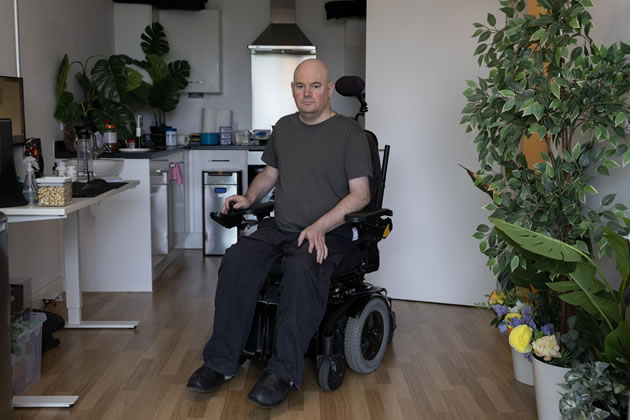Quadriplegic Man Battles to Get Door to His Flat He Can Open
Richard Amm says housing association obliged by law to make provision

Richard Amm in his flat. Picture: Facundo Arrizabalaga/MyLondon
October 27, 2025
A leaseholder in the borough of Hammersmith & Fulham with muscular dystrophy said he has to flag down strangers to open the door to his building due to a lack of accessible entry.
Richard Amm, 42, moved into his block this summer having spent more than a year searching for a new home.
While knowing he would struggle to open the front door, he said the property was the most appropriate he could find. He first contacted the provider, Notting Hill Genesis (NHG), requesting an electronic door opener be installed in January.
Mr Amm, however, said he battled months of poor communications and limited updates from NHG, with a further complication being that it does not believe it is responsible for the work.
NHG recently committed to funding the adaptation though Mr Amm said he is not convinced it’ll happen anytime soon despite assurances.
“I don’t believe them frankly,” he told the Local Democracy Reporting Service (LDRS). “I think they’re just playing for time. They have not been acting in good faith as far as I’m concerned. They’ve ignored maybe two-thirds of my emails and communications.”
A spokesperson for NHG said they have been working with Mr Amm to get the door issue resolved “for some time” and that they expect the upgrade to be completed in around four weeks.
Mr Amm is functionally quadriplegic, meaning he has limited use of his arms and legs. His condition, muscular dystrophy, is a progressive muscle-wasting illness which reduces the range, flexibility and strength of his limbs.
As such he is wheelchair-bound and has very little strength in his arms, meaning gripping heavy door handles and the like is extremely difficult.
Mr Amm said he began searching for a new home due to his previous building being covered in flammable cladding.
Due to his disability, however, he said there is very little on the market which meets his needs, with most places he saw either being lower ground, upper ground, having extra narrow split entry ways or simply unaffordable.
He said the flat he ended up buying was the most suitable place available, even given issues including accessibility problems with the door to his flat and the entry to the building.
Mr Amm paid to have the door to his flat upgraded with a system which enables him to open and close it using an attachment to his wheelchair.
But he understood that, under the Equality Act, it was incumbent on NHG to make changes to the front door to the building to ensure it is accessible as well, but this has not yet happened.
In communications with NHG seen by the LDRS, after first contacting the housing provider in January there were times when several weeks would go by without response. While he would receive apologies for the delays, this meant Mr Amm’s move-in date was edging closer with no sense as to whether any amendments would be made.
Mr Amm told the LDRS, “They didn’t reply. And then things came through and there was a back and forth. They weren’t very forthcoming.”
“I wanted things to be accessible when I moved in, but not months afterwards,” he added.
At one point Mr Amm was told a concern was that the work would cost £15,000, something he queried. A second, reduced quote was later provided, though NHG has maintained it is not responsible for the communal areas of the building.
Advice provided to Mr Amm by a lawyer appears to back this, though he claims the work should be covered by the Equality Act.
“One of the issues as a wheelchair user is I have to grab the door and hold it open while also going through it,” he said. “And as I don’t have use of my arms, that’s a very, very difficult to do.”
Mr Amm said since moving in he has had to ask random people passing by to help him open the door to the building, something which puts both himself and his neighbours at risk.
“I’ve had to flag down random strangers to open the door for me. During the day, during the night. Thankfully during the summer there have been people around, but as the weather is getting colder there are fewer and fewer people milling around. So it has felt really unsafe.
“I’m giving a random stranger access to my building, they can see that I’m vulnerable, they know where I live. I’ve definitely been feeling very anxious about it.”
NHG has recently told Mr Amm it will be funding the new door, though he said his experience to-date means he remains sceptical.
“Accessible homes are really, really hard to find,” he added. “I didn’t realise I’d have to fight this hard just to get very basic accommodation.”
A Notting Hill Genesis spokesperson said, “We have been working with Richard to get the door issue resolved for some time and will be installing an automatic door opener at his building. A contractor has been arranged, but the part needed was not available. We expect work to be completed in around four weeks and are working to support Richard until then.
“This issue was complicated by the fact we are not responsible for the communal areas of the building, but thankfully the freeholder has given us permission to install the new door.
“We will fund the installation in full, but ongoing maintenance costs must be borne by leaseholders via their service charge. We always take service charge costs very seriously so needed to follow internal processes to secure agreement for this approach.”
Ben Lynch - Local Democracy Reporter